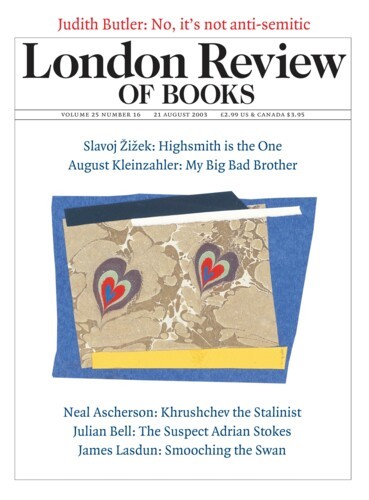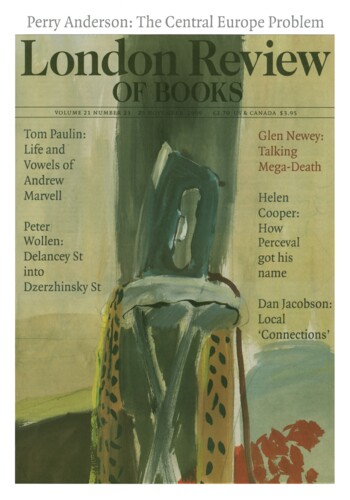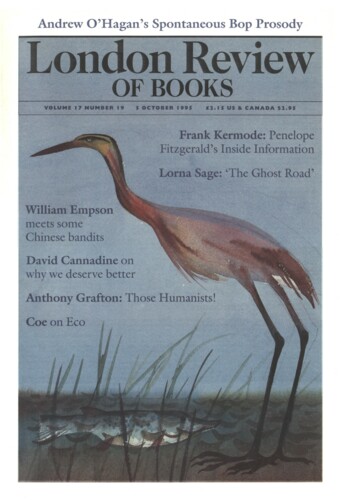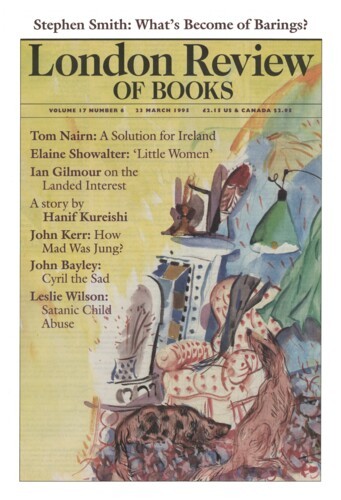Leslie Wilson
Leslie Wilson’s most recent book is Last Train from Kummersdorf. She lives in Berkshire.
Diary: Nazi Germany civil service
Leslie Wilson, 25 November 1999
I can’t remember liking my German grandfather. ‘Oh,’ said my mother, ‘you adored him when you were a baby.’ That was in the incredible time when things were right, when my grandparents still lived together. But then my grandfather wanted to marry another woman and – my mother told us – had my poor, fragile, religiously-obsessed Omi locked up in a mental hospital. Now she lived like a ghost in our house. She didn’t speak English, hid from visitors and only went out to go to church: she’d walk three miles into Nottingham, to go to the Polish Mass in the cathedral because it reminded her of Silesia. Her eyes were faded and sad. Opa, a respected senior police officer in retirement, lived with his new wife in Wirtschaftswunder prosperity and we could never tell Omi we saw them, because she couldn’t bear to know that she was divorced.’‘
Mao’s Pleasure
Leslie Wilson, 5 October 1995
In 1949, when many of China’s citizens were running from the newly-victorious Communists, Dr Li Zhisui returned to his homeland. He had been making good money as a ship’s doctor with the Australian Oriental Company, and he could have stayed there or joined his wife in Hong Kong. But since Australia only admitted white people to citizenship, and in Hong Kong he could have become only the ‘disenfranchised subject of a foreign king’, he decided to take part in the reconstruction of his own country: this, he writes, was more important to him than making money. Besides, he wanted to become a neurosurgeon, and non-whites were barred from the top medical posts in both Australia and Hong Kong. Dr Li had a letter from Fu Lianzhang, deputy director of public health, which promised him a suitable job in China: five years later he became personal physician to Chairman Mao Zedong. He didn’t want the honour.
Salem’s Lot
23 March 1995
Salem’s Lot
Leslie Wilson, 23 March 1995
On 28 November 1988, Paul Ingram, a police officer, was arrested by colleagues in his office in Olympia, Washington State. His daughters, Ericka and Julie, had accused him of sexual molestation. Ingram made no attempt to deny the charges. He couldn’t remember doing anything, but he said: ‘My girls know me. They wouldn’t lie about something like this.’ He then started to build up the case against himself. Being a deeply religious man, he prayed feverishly for God’s guidance. He’d read in a magazine that there was a way of sending yourself into a trance. You had to imagine yourself entering a warm white fog. He tried this out, and the images came to him.
Pieces about Leslie Wilson in the LRB
Farewell Hong Kong
Penelope Fitzgerald, 24 February 1994
Samuel Pink is brought up in an English country rectory in the 1880s. He knows that the Pinks are not his real father and mother. He believes that he is the illegitimate son of Queen Victoria by...
Under Witchwood
Adam Thorpe, 10 September 1992
A modern witch is a Witch. The upper case denotes a self-consciousness born of safer times: Witchcraft is now a minority faith to be taken seriously (at least in the States), and there is even a...
Read anywhere with the London Review of Books app, available now from the App Store for Apple devices, Google Play for Android devices and Amazon for your Kindle Fire.
Sign up to our newsletter
For highlights from the latest issue, our archive and the blog, as well as news, events and exclusive promotions.




